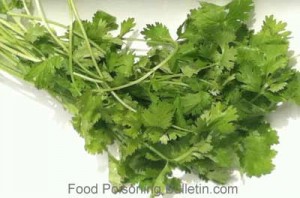Eight people in Wisconsin contracted Cyclospora infections after eating cilantro imported from Mexico that was grown in fields contaminated with human waste. The U.S. Food and Drug Administration (FDA), which has put a ban on summer imports of cilantro form the implicated area, says the illnesses are part of a two-state outbreak of parasitic infections that includes more than 200 cases in Texas.
Cyclospora infections are usually associated with travel to developing counties. When ingested in its mature state, the parasite causes an infection called cyclosporiasis which causes profuse, often explosive, diarrhea that can last up to two months. Other symptoms of cyclosporiasis, which can also last more than 60 days, include abdominal cramps, bloating, gas, nausea, fatigue, loss of appetite, weight loss, vomiting, body aches, low-grade fever, and other flu-like symptoms.
 Normally, only about 150 cases are reported throughout the U.S. each year and most of them are associated with travel to developing countries. But for three straight summers, Americans have endured major Cyclospora outbreaks linked to contaminated cilantro from the Puebla region of Mexico.
Normally, only about 150 cases are reported throughout the U.S. each year and most of them are associated with travel to developing countries. But for three straight summers, Americans have endured major Cyclospora outbreaks linked to contaminated cilantro from the Puebla region of Mexico.
To identify the source of these outbreak, the FDA and Mexican regulatory officials investigated farms and packing houses in Puebla and other areas of Mexico to see if conditions and work practices may have led to contamination of the cilantro. Since 2013, they have visited 11 Puebla farms and packing houses that produce cilantro and found that all but three of them had serious problems including five operations that were linked through traceback investigations to the U.S. outbreaks.
The conditions they observed included “human feces and toilet paper found in growing fields and around facilities,” according to the FDA announcement of the ban. They also found inadequately maintained and supplied toilet and hand washing facilities meaning these facilities lacked soap, toilet paper, paper towels or running water. Some operations had no toilet or hand washing facilities. The crates used to transport the vegetables were visibly dirty, and water used to wash cilantro was vulnerable to contamination from sewage/septic systems. At one firm, water in a holding tank used for employee hand washing contained Cyclospora.
Based on these findings, the FDA concluded that cilantro was being contaminated when the parasite was shed in human feces left in the growing fields and processing areas. and the agency issued an import alert on cilantro from that area. The alert allows U.S. officials to detain without physical inspection any cilantro shipments from the Puebla region from April 1 through August 31. It covers fresh in tact and chopped cilantro,
So far this summer, 205 cases have been reported in Texas and at least eight cases have been reported in Wisconsin.
Most of the Texas cases are in Travis County which includes the Austin metropolitan area. The metro areas of Austin, Dallas and San Antonio have also been hard hit.
Health officials say anyone who has cyclosporiasis symptoms should see a doctor. Tests can confirm if there is a parasitic infection and antibiotics can help to clear it.
In 2014, 126 people in Texas were sickened by cilantro sold at grocery stores and served at restaurants. Health officials never disclosed the name of the establishments linked to the outbreak because there was was no product left to test by the time illnesses were discovered.
A 2013 Cyclospora outbreak sickened 270 Texans. Hundreds of people in 25 other states were also sickened by Cyclospora that year, but only the Texas cases were linked to cilantro. In Iowa and Nebraska, 227 cases were linked to a salad mix produced by Taylor Farms of Mexico which were served at Red Lobster and Olive Garden restaurants.
As in years past, health officials have not released the names of the stores where the contaminated product was sold or the names of the restaurants that served it. But they urge anyone in Wisconsin, Texas or other states who has eaten cilantro and who is experiencing these symptoms to see a doctor and mention possible exposure to Cyclospora.
Although Cilantro and salad greens have been linked to recent outbreaks, the are not the only kinds of produce that have been linked to Cyclospora outbreaks. Raspberries, snow peas, basil, and mesclun have been named as outbreak sources in the past.




